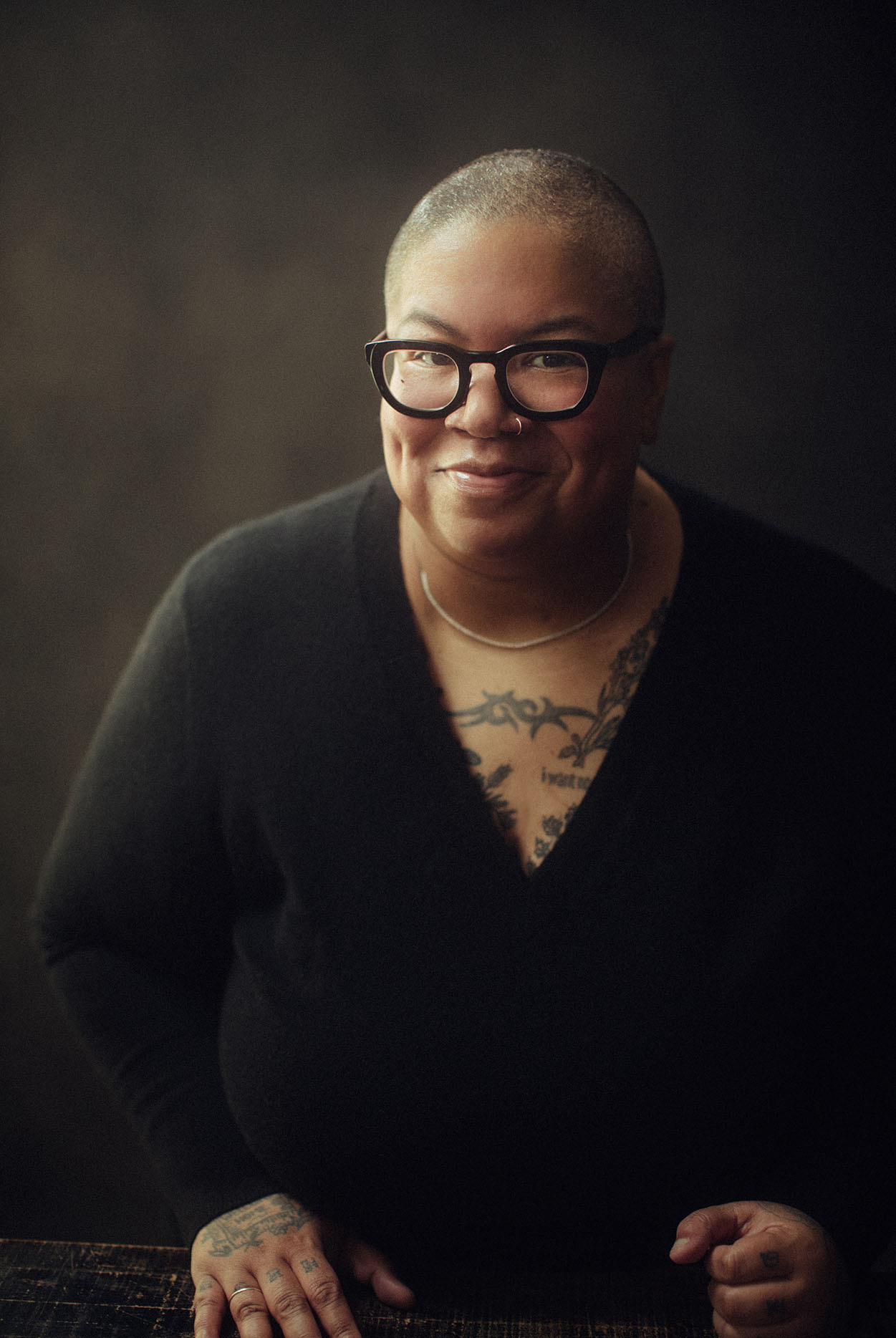
Samantha Irby has been doing confessional comedy for a long time, long before she started working on her fifth book, Quietly Hostile; or writing her Substack, which features regular rundowns of the latest Judge Mathis episodes; before she became a Hollywood writer on shows like And Just Like That… and Shrill. Her life has changed since the 2013 release of her first essay collection, Meaty, with big moves from Chicago to Michigan, and from dark clubs to red carpets. But Irby’s almost unbearably honest tone has remained steadfast. Before the launch of Quietly Hostile, she got on a call with Hacks writer and comedian Pat Regan, a fellow devotee of unbridled openness, to talk about the minefield that is navigating Hollywood.
Pat Regan: I read the “Chub Street Diet” [essay]. My favorite moment was when you absolutely fileted the concept of the general meeting, [an introductory meet-and-greet with executives]. We should be getting $3000 for a general meeting.
Samantha Irby: Here’s my beef, although you probably have the same beefs. These meetings are presented to you as if they are incredibly important, right? It’s like, “Jing Jong at Bing Bong wants to talk to you. He’s very busy. He can see you at 4:02, you cannot go past 4:09. Don’t swear, don’t look him in the eye. It’s really important.” And then you get in there and you’re like, “Hey Bob John, hey Carl Charles.” And they’re like, “Oh hey, who are you?” It’s like, “Well, whoa, I was told that you love me and my work and that this was a really important meeting, and it’s very sad that I’m finding out both of these things are not true, for free, and you’re never going to make anything of mine because it’s too weird.” You can’t imagine how many times I’ve heard “too niche, too weird, too sexy, or disgusting.” So yes, I’m with you, and they can afford it. You think fucking Sony can’t afford, Netflix can’t afford, to give you $3000 or something?
Regan: Buy me lunch or something. Give me your UberEats login at least! I feel like I’ve spent hours of my life that I’ll never get back ever, no matter what, just kind of sitting in Zooms with gorgeous young women with clear glasses. They’re like, “I grew up on Long Island, and I like Succession.” There’s millions of them out there.
Irby: I’m obsessed with you.
Regan: I’m obsessed with you. I’m curious, I write television, but I try to write prose sometimes. You wrote prose first and then you got into TV? What do you like better?
Irby: I like my own stuff because it’s just mine. I can do it and nobody’s like, “Uh-uh, don’t put that in it.” Not even my editor who should be protecting me from humiliating myself. She’s always like, “Whatever, it’s going in. Can’t wait to tell America this horrible thing about you.” But I appreciate that TV writing is collaborative. No one reads, but a lot of people watch TV, and they roast you over TV shows. I like having it be somebody else’s fault. I love being like, “Oh, 17 people up the chain read this thing that I wrote. If you hate it, you hate them.” Now here’s the thing people won’t say: I like doing books more because it pays better.
Regan: Oh, is that true? This is why I’m so envious of you: there has to be a way with modern science for me to live in neither LA nor New York. There has to be a way where that can happen, and I feel like books are the journey. I told this TV writer that and they said, “Well, how will you own property then?”
Irby: As a person who lives in Kalamazoo, Michigan, how can you own property in New York or LA no matter what you fucking do?
Regan: I know.
Irby: I have a house. Well, it’s not paid off, let’s be real, but I have a little ranch house because it’s Michigan. That’s one thing that makes me so mad. I know there are people who are 22, living with seven roommates, getting staffed on shows that pay them nothing, and they’re taking their lunch home for dinner. I hate that it’s like, “Well you have to live in this place that’s hard to live in and very expensive, and all of your money is gonna go to your housing.” I think that is so unfair. You know Caleb Hearon, right? He and I were talking—we’re both from the Midwest—and I was like, why can’t we do something in the center of the country? Can we build a little Hollywood hub between Los Angeles and New York? And then everybody can have a house; they can have some land. Why aren’t we doing this?
Regan: I don’t know. You know, it’s funny, my first job for years was on Zoom, and I was like, “This is so fun, but I want to be in person because you get a free lunch and that sounds amazing.” Now I’m in person and I want to be in my bed.
Irby: Yes. If I text or do some shit on my phone, I don’t want the showrunner to be like, “Uh, excuse me?” If we’re on Zoom, I can have a movie playing, and no one will know.
Regan: 1000 percent. One time, I was in a room and in the background, I had other tabs open from my personal life. Gay, guy on guy, pornography started playing in the background. Everyone was so cool about that, and, in fact, everyone loved it.
Irby: I would have been very excited.
Regan: How do you know when you shouldn’t put something in a book? Do you feel weird, ever? Or you don’t care?
Irby: My tried and true rule, and everyone who writes about themselves should adopt this, is if you couldn’t handle it being on the news, don’t put it out in the world. The shit that resonates with people, or that they remember, you never know. People will come up to you and be like, “You know that time you wrote about getting fucked brutally in the ass while trying to make a phone call?”
Regan: The worst is when something seems so funny to you… I’m loosely single. Were you married when your first book was published?
Irby: No, no, my first book was all about every horrible dude I shit on while having sex. What’s weird is my wife read my first book and reached out and was like, “I love your book.” Then we just kept talking and then we got together.
Regan: Oh my god.
Irby: I know it’s a little insane. It’s very lesbianish.
Regan: It’s the dream.
Irby: She messaged me on Twitter, ugh, of all the toilet bowls to meet in. It’s interesting to think about if I was single now, would I put all this out? Because you’re essentially giving a potential partner a road map to all your fucked up shit.
Regan: I’m sure there must be for you—I feel this way—some sort of parasocial element that sometimes feels strange. Do you ever feel weird about that?
Irby: Only on the occasions where someone will just be too familiar. If somebody just comes up to you and they’re like—I mean, no one has ever done this—if someone was like, “Yeah, that thing you said about your pussy…” That feels like, maybe don’t say it like that. I am a person. I wrote that for your entertainment, but I know how to talk like a human being. You can just be normal.
For the most part, I try to write from a place where I’m not talking down to anyone ever, just sort of looking across and being like, “Hey, can you believe we’re in this shitty situation together?” I think that fosters an “Oh this is my friend who’s talking to me” kind of relationship. I don’t mind that because I did it myself. It is sometimes jarring when people remember a thing that I don’t. First of all, I’m fucking stoned all the time. But also I’m old. I don’t remember everything. If someone is really bringing up the Samantha Irby archives, that sometimes is weird where I’m like, “I wrote what in 2009?” But for the most part, because I’m an insane, needy egomaniac, I like the proof that people love me.
Regan: I got 150 DMs in one day because an article came out that said that scientists somewhere used the sperm of two male rats to create a baby, and I don’t know what I’ve ever said in the podcast that made people think this, but I got so many messages like, “I know you’ll love this story!” I don’t know what makes you think I care about gay rats. I don’t care about gay rats.
Irby: Can we talk about that? People quoting my own shit or saying my own stuff back to me? Fine. What is crazy is when someone sends you something like, “Oh, I know you would love this,” and it’s like, “I don’t! What have I said?” That’s what makes me rethink shit is when somebody is like, “Oh, here’s a snuff film I thought you would love.”
Regan: It makes you question everything you’ve ever said. Your essays are so funny. Do you read them on stage or go around doing shows and readings to see what hits?
Irby: So the way I got my first book published—how do I tell the story so it’s not long and boring? Chicago has a big storytelling scene. And for years, I used to host a show, a storytelling show called the Sunday Night Sex Show. Every night of the week you could go out and see people reading stories. That is how my writing career actually started, because I would write things for these shows. The audience would go crazy.
One day these two dudes who ran a really small publishing company, they were like, “You want to do a book with us?” And I was like, “No, it sounds like so much work.” It took two years of them nagging me, and then I did it. Somehow my now agent got the book and called me, and the rest is history. But I spent so much time in dark Chicago bars. I can’t do stand-up because a stand-up audience is encouraged to be mean to you, and I’m too fragile.
Regan: Next time you’re in New York, you should.
Irby: The thing about stand-up though is off-book is hard for me. I put so many words into these goddamn essays. They’re just all long, run-on sentences. I don’t want to be embarrassed and forget what I want to say.
Regan: I do a notebook when I do a long set because it makes me feel literary. For some reason, when I bring up a notebook, I feel like Kathy Griffin or something.
Irby: I don’t know if we’re supposed to still admit this, but I love her. She says wild shit and sometimes I think, So you don’t worry about getting beat up, huh? I love that because I’d be like, “Who’s gonna kill me after I say all this shit about them?”
Regan: She’s definitely not afraid in ways that maybe I am.










 in your life?
in your life?

